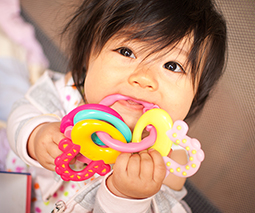Breakthrough discovery for earlier detection of autism

Flinders University has recently revealed a ground-breaking eye scanner that could possibly change the way we detect autism spectrum disorder (ASD) in children.
Earlier detection of ASD
According to the Flinders University website, Dr Paul Constable, senior lecturer, College of Nursing and Health Science at Flinders University has been searching for an autism eye-biomarker since 2006, having had his son diagnosed with autism at the age of three.
“We found a pattern of subtle electrical signals in the retina that are different in children on the autism spectrum, which relates to differences in their brain development,” Paul reported on the university website.
Thirteen years of research has now produced a simple hand-held device that is able to detect the electrical signals in the retina that signify autism. “It’s a quick, non-intrusive eye-scan using a hand-held device and we anticipate it will be equally effective on younger children,” says Paul.
Early intervention
The discovery will enable children to be diagnosed earlier which will help with earlier intervention and getting family support into place. “Very early diagnosis means not only can children receive important interventions, but families are empowered to get the necessary supports in place, come to terms with the diagnosis, and make informed decisions,” Paul commented on the website.
Further investigating is showing the possibility of detecting other conditions in children such as attention deficit hyperactivity disorder.
All in the Genes
The sooner autism is detected, the sooner treatment and support can begin. And if you know there is a greater chance of your child having autism, for example, you have a family history of ASD, then an early test such as the eye scan proposed by Flinders University will be enormously beneficial.
A recent study, published in JAMA Psychiatry, showed that 80 percent of autism risk comes from genetic factors. The research was extensive, looking at over 2 million children across Denmark, Finland, Sweden, Israel and Australia.
This is important information for parents with a family history of autism. Eighty percent is a significant statistic, so therefore those parents can be better prepared. The more ready parents are, the sooner treatment can start, which has proved to make a significant difference to the child’s development.
Looking forward
According to The Conversation, a recent Australian study shows that for children diagnosed with autism, early treatment can be hugely beneficial. Usually children are diagnosed at the age of two; however, the study revealed that starting therapy with babies as young as 12 months may offer increased benefits.
“Parents of toddlers who received six months of early therapy reported that their child understood an average of 37 more words, and spoke an average of 15 more words than those who didn’t receive the therapy,” reported The Conversation.
Now with the discovery of the eye scanner, all parents, particularly those who know their child may be predisposed to ASD, might be able to receive help and support earlier than ever before. Sooner is better – and now, even more possible.









